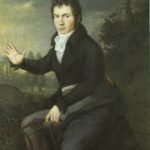
Music for a Desert Island
Hello Dear Reader,
I am sometimes get asked when and where I like to listen to music in my personal life, given my professional interest in the subject. It may surprise you to hear that I almost never listen to music whilst commuting to work by train. If I am not working on my laptop (when I prefer silence) then I prefer podcasts.
There can be times, on tough days, when I am drawn to music for emotional reasons, but in general I am put off by the low quality of my commuting headphones combined with the low resolution of music files on portable devices. ‘Tinny’ music feels like a disappointment rather than a boost.
An exception to my listening commuting habits is a well-known and long standing podcast that features snippets of music. Radio 4’s Desert Island Discs (DID). I listen to this podcast every week and it is a highlight of my Monday morning commute.

DID was first broadcast on the BBC Forces Programme on 29 January 1942, hosted by Roy Plomley. It is currently hosted by Kirsty Young.
The premise is simple: each week a guest – a public figure – comes on the show to act as the ‘castaway’ who must select 8 music tracks (sometimes these are spoken tracks such as theatrical readings, but that is rare) that they would like to take with them if they were to be stranded on a desert island.
The castaway is interviewed about their life experiences and views, a process that is cleverly interspersed with their music choices. At the end, the castaway must choose the one record they would save from the waves in a storm.
When I lived in Switzerland I had the happy fortune to come across the DID archive online. What a treasure trove! Politicians, musicians, scientists, historians, naturalists, authors, artists, all well-known, high achieving figures from the 20th and early 21st century are interviewed. In some cases the DID recording is the only known one-on-one interview with the individual that still survives.
My favourites from the archive are David Attenborough (one of the few people to have been interviewed twice), Jacqueline du Pré, Tom Hanks, Louis Armstrong, Lauren Bacall, Kenneth Williams and Terry Wogan. There is a nice free to access Guardian article here where you can get an idea of many other guests over the years.

An enjoyable fact -The most requested piece of music over the first 60 years of DID was “Ode to Joy”, the last movement of Beethoven’s Ninth Symphony
Dear Reader, what would be your 8 discs, I wonder?
As much as I enjoy the podcast, it had occurred to me over the years that this archive could be a wonderful research resource. Personal music choices of prominent individuals stretching back to the 1940s – what reasons do they give for their choices, what memories and emotions do they evoke for their devoted listener, and what are the patterns we can see in their musical selections?
I am not the only music psychologist with this thought. Recently I came across a paper by my colleagues Don Knox and Raymond MacDonald looking at the relationship between occupation and music preferences in DID. The idea is that publicly expressed musical preferences not only reinforce an individuals self view but also communicate that information to others.
 In the paper (2017) the authors look back at the 72 year old archive with the hypothesis that occupation is related to musical preferences. To code the data they adopted the framework of Holland’s RIASEC model of vocational personality types (Realistic, Investigative, Artistic, Social, Enterprising, and Conventional) and Rentfrow’s MUSIC five dimension model of preferences, focusing on music-focused genre groupings as specified in this model (Mellow, Unpretentious, Sophisticated, Intense, and Contemporary).
In the paper (2017) the authors look back at the 72 year old archive with the hypothesis that occupation is related to musical preferences. To code the data they adopted the framework of Holland’s RIASEC model of vocational personality types (Realistic, Investigative, Artistic, Social, Enterprising, and Conventional) and Rentfrow’s MUSIC five dimension model of preferences, focusing on music-focused genre groupings as specified in this model (Mellow, Unpretentious, Sophisticated, Intense, and Contemporary).
The authors looked into the choices of 2584 people who appeared on DID (10, 696 tracks, reduced due to availability of track information), followed by a second analysis of 2611 people (12, 161 tracks). The first analysis looked at associations between RIASEC occupation types and MUSIC dimensions. The second analysis looked into specific auditory qualities of music including loudness, tempo, energy, danceability, instrumentalness, and valence.
Results
Artistic types associate with Sophisticated music, but negatively with Intense and Unpretentious music.
Enterprising types are almost the opposite as they associate with Intense music but not with Sophisticated music.
Investigative types showed no significant associations thought the patterns were for them to associate with Mellow and Intense music, but not with Unpretentious music
Realistic types (more below) associated with Unpretentious and Intense music, but not with Sophisticated music.
Social types associated with Unpretentious and Contemporary music, but not with Sophisticated music.
The associations between occupational and music qualities (2nd analysis) were lengthy and complex but in summary, the patterns of acoustic attributes provided more information to discuss the larger scale groupings of genre; to allow us to consider what it may be about particular music styles that appeal to people with certain occupations.
For example, the Realistic type chose music with high energy, loudness, and tempo, that was mostly electric and danceable. These match with the Intense dimension of music but not Unpretentious (as shown above); however, this group also has a preference for more positive valence music, which likely drives the relationship with Unpretentious music (it is less associated with Intense music).
Discussion
As expected, there were many associations between occupation type and music preferences as expressed in DID archives, which the authors discuss in the light of personality theory. For example, associations between Artistic occupations and Sophisticated music make sense as both factors have previously been linked to a personality trait called Openness to Experience.
 Not all the patterns could be easily explained however, a finding that is, in my opinion, due to the nature of the forum – these are music preferences expressed by public figures for the public eye. They may be reflective of personality to some extent but are probably also deflective in nature, at least in some cases. The music choices are given to project an image, as much as we would like to believe they reflect the ‘real person’ we see on screen or read about in the press/ history books.
Not all the patterns could be easily explained however, a finding that is, in my opinion, due to the nature of the forum – these are music preferences expressed by public figures for the public eye. They may be reflective of personality to some extent but are probably also deflective in nature, at least in some cases. The music choices are given to project an image, as much as we would like to believe they reflect the ‘real person’ we see on screen or read about in the press/ history books.
All in all, a very nice example of database and algorithm research that has the potential to gain new insights into existing music preference models and also ask new questions, in particular about what drives our self-expressed music choices in different social forums.
There are many more possible research projects buried within the DID archive and I shall be keeping an eye out for further insights as much as I will continue to enjoy my Monday morning commute with this fascinating podcast.
